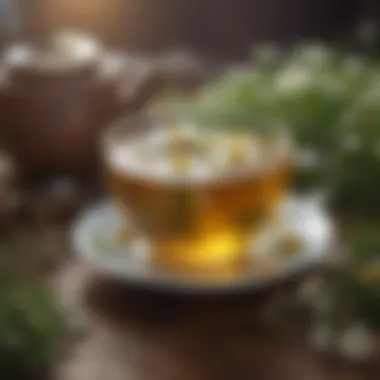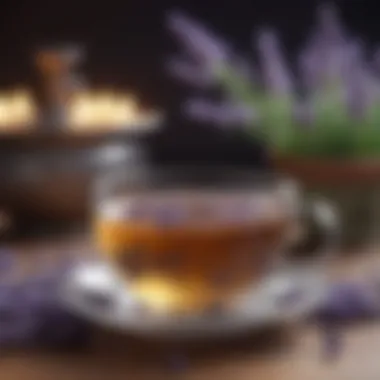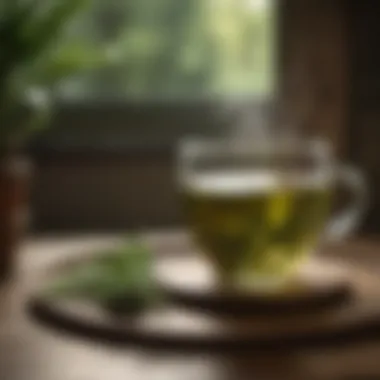Explore the Best Teas for Anxiety and Depression


Research Overview
Preamble to the Topic
Tea has been a staple in many cultures for centuries, often celebrated for its flavor and health benefits. Recent research has also shed light on its potential role in managing anxiety and depression. Understanding this association is crucial, given the increasing prevalence of mental health issues in modern society. A growing body of evidence suggests that certain types of tea can provide therapeutic effects that may complement traditional treatments.
Summary of Existing Research Findings
Scientific studies have shown that various teas contain compounds that exhibit anti-anxiety and antidepressant properties. For instance, green tea is rich in L-theanine, an amino acid known to promote relaxation without sedation. Similarly, chamomile tea has been linked to reduced symptoms of generalized anxiety disorder. Research also indicates that herbal teas like lemon balm and passionflower may assist with mood regulation. While more research is needed to confirm these effects, initial findings have provided a promising glimpse into how tea can support mental health.
Key Research Methodology Explained
The methodologies used in these studies often include randomized controlled trials and observational studies. Participants are often given specific types of tea over a period of weeks, and their mental health status is measured using standardized assessment scales. This approach helps in establishing a correlation between tea consumption and improvements in anxiety and depression symptoms. While these methods have their limitations, they provide valuable insights into the potential benefits of tea for mental health.
Foreword to Tea and Mental Health
The intersection of tea and mental health is a topic of growing interest, particularly concerning how certain types of tea can assist in managing anxiety and depression. In today's fast-paced world, many individuals seek natural remedies to foster emotional well-being. Tea, with its rich history and diverse varieties, offers a compelling avenue for exploration. Its potential benefits extend beyond hydration; it has the capacity to influence our mood and overall mental state.
Understanding mental health challenges such as anxiety and depression is essential. These conditions can profoundly affect daily life, impairing one’s ability to function and maintain relationships. Throughout history, cultures around the world have turned to tea not only for its physiological benefits but also for its calming effects. As we delve deeper into the relationship between tea and mental health, it is crucial to examine the historical context of tea consumption and analyze how these age-old practices resonate with contemporary understandings of mental health.
This section will set the stage for a comprehensive discussion on specific teas that may offer tangible benefits. By evaluating how tea interacts with our biology, we further appreciate its significance in enhancing emotional well-being.
The Historical Context of Tea Consumption
Tea has a long history, originating in ancient China thousands of years ago. Initially used for medicinal purposes, the leaves of the Camellia sinensis plant were believed to aid in a variety of ailments. Over centuries, tea made its way through trade routes, becoming popular in various cultures across Asia, Europe, and eventually, the world.
In many cultures, tea rituals developed not just as a means of consuming a beverage but as a comforting social activity. The Japanese tea ceremony, for instance, symbolizes harmony and mindfulness. Similarly, in British culture, afternoon tea has become a cherished tradition, often associated with relaxation and social interaction.
The historical significance of tea extends to its perceived health benefits. Many cultures incorporated different herbs and leaves not only for flavor but also for their calming properties. For example, chamomile and peppermint are commonly used for their soothing effects, reflecting the long-standing belief in tea’s ability to calm the mind.
Understanding Anxiety and Depression
Understanding anxiety and depression is crucial when discussing how tea might contribute to mental health. Anxiety can manifest as excessive worry, tension, and physical symptoms like increased heart rate. Depression, on the other hand, often includes persistent feelings of sadness, loss of interest, and fatigue.
Both conditions are complex and can be influenced by biological, psychological, and environmental factors. Current statistics indicate that anxiety can affect millions globally, while depression remains a leading cause of disability. Identifying effective, natural methods to manage these symptoms is essential for many individuals seeking relief.
Tea’s calming properties are partly attributed to certain compounds that may positively influence neurotransmitter activity in the brain. Research suggests that some teas may lower stress levels and promote relaxation, making them a worthwhile consideration for those managing anxiety and depression. By integrating knowledge about tea and its historical backdrop with an understanding of mental health issues, we can begin to appreciate its role in supporting emotional well-being.
The Science Behind Tea and Mental Health
Understanding the science behind tea and mental health is crucial as it bridges ancient practices with contemporary research. This section examines how tea influences anxiety and depression through specific biological mechanisms. The relationship between mental health and individual lifestyle choices has gained prominence, and tea consumption is a component worthy of exploration. This investigation into the components of tea reveals potential benefits and considerations for integrating tea into holistic wellness practices.
Phytochemicals in Tea
Tea is rich in phytochemicals, the bioactive compounds that contribute to its health benefits. These substances include polyphenols, flavonoids, and catechins, which exhibit antioxidant properties. Notably, the antioxidants in tea help protect cells from oxidative stress. Oxidative stress has been linked to various mental health disorders. This suggests that maintaining a balance through dietary choices may promote better mental health.
Studies have shown that regular consumption of tea could reduce inflammation, which plays a role in anxiety and depression. Generally, drinking tea daily may be a simple and pleasant way to support mental well-being.
The Role of Caffeine
Caffeine is a well-known stimulant found in tea. It can affect mood positively by increasing alertness and focus. However, people's sensitivity to caffeine varies widely. For some, moderate caffeine intake can enhance concentration without inducing anxiety. Conversely, excessive amounts can lead to jitteriness and restlessness, potentially exacerbating anxiety symptoms.
Green tea and black tea contain caffeine, but in lower quantities than coffee. Choosing teas with lower caffeine, like white tea, may also ease anxiety. It is essential to consider personal tolerance levels to caffeine when selecting teas for mental health support.
Impact on Neurotransmitters
Tea can influence neurotransmitter activity, particularly serotonin and dopamine, which are critical for mood regulation. Some research suggests that the L-theanine found in green tea can promote relaxation without sedation. This compound may boost dopamine levels and enhance alpha wave activity in the brain, which contributes to a calm and alert state.


The interaction of tea compounds with neurotransmitters presents a pathway for potential relief from anxiety and depression symptoms.
Furthermore, the act of brewing and drinking tea can be a mindful practice, enhancing its calming effects. Establishing a ritual around tea can also positively influence overall mental well-being. By incorporating specific teas into a daily routine, individuals may notice significant improvements in their mood and stress levels.
Through a greater understanding of these scientific elements, readers can make informed choices about tea consumption aimed at improving mental health.
Types of Tea Beneficial for Anxiety and Depression
Tea has long been recognized as more than just a beverage; it is a source of potential relief for those grappling with anxiety and depression. The compounds found in various types of tea offer therapeutic effects that can enhance emotional resilience and promote a sense of calm. Understanding which types of tea may be particularly beneficial allows individuals to make informed choices regarding their mental health. Each tea type discussed below not only brings unique flavors but also distinct health qualities that might aid in alleviating symptoms of anxiety and depression.
Chamomile Tea
Chamomile tea is widely known for its calming effects. It is often used as a natural remedy for anxiety and sleep disturbances. The apigenin present in chamomile binds to specific receptors in the brain, promoting relaxation and reducing feelings of stress. Consuming chamomile tea before bedtime can facilitate a better night's sleep, which is crucial for mental well-being.
Benefits of Chamomile Tea:
- Reduces anxiety levels
- Promotes better sleep quality
- Anti-inflammatory properties
Green Tea
Green tea possesses L-theanine, an amino acid that is linked to relaxation without sedation. It can help in reducing anxiety and increasing attention. The caffeine content is less than that of black tea or coffee, making it a suitable alternative for those sensitive to higher doses of caffeine. Green tea may also support cognitive function and enhance mood through its antioxidant properties.
Benefits of Green Tea:
- Enhances cognitive function
- Reduces stress responses
- Contains powerful antioxidants
Lavender Tea
Lavender tea is recognized for its distinct aroma and soothing properties. It can help in easing symptoms of anxiety and depression. The essential oils in lavender have calming effects, which may reduce stress hormones in the body. Drinking this tea can be a calming ritual to incorporate into one’s day for promoting serenity and emotional balance.
Benefits of Lavender Tea:
- Improves sleep quality
- Lowers anxiety levels
- Acts as a mood enhancer
Peppermint Tea
Peppermint tea offers a refreshing flavor along with potential benefits for mental clarity and relaxation. The menthol in peppermint can help in reducing tension and may even improve symptoms associated with irritability. While it may not directly target anxiety, it promotes overall mental wellness and can be a valuable addition to a balanced routine.
Benefits of Peppermint Tea:
- Relieves tension headaches
- Promotes clarity and focus
- Refreshing and invigorating aroma
Lemon Balm Tea
Lemon balm tea, derived from the lemon balm herb, is often used for its calming effects. It may help with stress, anxiety, and insomnia. The compounds in lemon balm can enhance the action of GABA, a neurotransmitter responsible for quieting the nervous system. Regular consumption can aid in achieving a more relaxed state of mind.
Benefits of Lemon Balm Tea:
- Calming effect on the nervous system
- Enhances sleep quality
- May improve mood and cognitive function
Rooibos Tea
Rooibos tea is caffeine-free and rich in antioxidants. It offers a sweet, nutty flavor that can be both soothing and enjoyable. Rooibos contains aspalathin, which may help to reduce stress levels. Its calming properties are particularly beneficial before bedtime, assisting in relaxation and better sleep enhancement.
Benefits of Rooibos Tea:


- Caffeine-free
- Rich in antioxidants
- Known for its calming effects
Passionflower Tea
Passionflower tea is less common but gaining popularity for its anxiety-relieving properties. It is particularly effective in improving sleep quality and lowering anxiety symptoms. The plant's natural compounds can increase levels of GABA in the brain, leading to a calming effect. This tea can be consumed during times of high stress to promote relaxation.
Benefits of Passionflower Tea:
- Aids in sleep quality
- Reduces anxiety and agitation
- Natural source of GABA
Brewing Methods for Maximum Benefit
Appropriate brewing methods can significantly enhance the effects of tea, particularly when targeting anxiety and depression. The way tea is brewed affects not only its flavor but also its beneficial compounds. Understanding proper brewing techniques can lead to a greater intake of the phytochemicals that have been shown to positively influence mental health.
Proper Brewing Techniques
When brewing tea for anxiety and depression, it's important to pay attention to various factors. The quality of tea leaves should not be underestimated. Loose leaf tea often offers more potent benefits compared to tea bags because loose leaf contains whole leaves with essential oils intact.
To begin the brewing process, start with clean, fresh water. Mineral content in the water can influence the extraction of flavor and compounds. If possible, avoid tap water that may have chlorine or other chemicals.
Next, measure the correct amount of tea. Generally, one teaspoon of loose leaf tea or one tea bag per cup of water is a good rule of thumb. This can be adjusted according to taste preferences.
Finally, steep the tea for the appropriate amount of time. Avoid over-steeping, which can lead to bitterness, and under-steeping, which may result in a lack of flavors and benefits.
Infusion Times and Temperature
Different teas require distinct infusion times and temperatures to unlock their full potential. For example, green tea should ideally be brewed at a lower temperature, around 160°F to 180°F (70°C to 80°C). Steeping for 2 to 3 minutes yields the best results for both flavor and health benefits.
In contrast, darker teas like black tea require higher temperatures, ideally boiling water at 200°F to 212°F (93°C to 100°C) and an infusion time of 3 to 5 minutes.
For herbal teas, such as chamomile or peppermint, a longer steep, around 5 to 7 minutes, is often recommended. The correct infusion time enables the release of beneficial compounds, contributing to enhanced relaxation and mood improvement.
"The extraction of beneficial compounds from tea is highly dependent on temperature and time. A small adjustment can make a difference to your health benefits."
In summary, following proper brewing methods and paying close attention to infusion times and temperatures can maximize the potential benefits of tea. Ensuring these elements are executed correctly will provide a more tonic experience, aligning with objectives for alleviating anxiety and depression.
Dosage and Consumption Recommendations
Understanding the right dosage and consumption practices is crucial when incorporating tea into strategies for alleviating anxiety and depression. Different teas possess unique properties, and how one consumes them can greatly enhance or diminish their beneficial effects. This section discusses the frequency of consumption and highlights teas that should generally be avoided.
Frequency of Consumption
The frequency of tea consumption can influence its benefits for mental well-being. Regular, but moderate, consumption is often recommended. Aim for about two to four cups daily. This frequency can provide various health benefits, especially in managing anxiety and depression. It allows the body to absorb key phytochemicals and other active compounds consistently.
For herbal teas such as chamomile and passionflower, these can be integrated into your evening routine. Their calming properties can help unwind after a stressful day. Alternatively, green tea can be consumed throughout the day, given its mild stimulant effects paired with calming L-theanine.
"Moderation allows for the full benefit of tea without overwhelming the body."
Pay attention to how your body reacts to different teas. Individual tolerance can vary. Some may find that two cups of green tea in the morning offer a boost in focus while avoiding jitters, whereas others might need to keep their intake to one cup for similar effects.
Teas to Avoid
While many teas boast beneficial properties, some may not be suitable for everyone, especially those with anxiety or depression. Consider avoiding:
- High-caffeine teas: These include black tea and some varieties of green tea. Excessive caffeine might exacerbate anxiety symptoms. Even if the tea is seemingly beneficial, its caffeine content can lead to palpitations and restlessness.
- Herbal blends with stimulants: Some herbal teas combine various stimulants. For example, those containing yerba mate or guarana can lead to increased feelings of anxiety rather than alleviating them.
- Teas with potential allergens: If you have allergies, be cautious with herbal blends. Ingredients such as hibiscus can provoke allergic reactions in some individuals.


Always listen to your body and consult with a healthcare professional if you doubt your reactions to a specific tea. Doing so will help in optimizing tea consumption for anxiety and depression while keeping side effects at bay.
Balancing the consumption of the right type of tea at appropriate frequencies will support mental health effectively.
Potential Side Effects and Precautions
When considering teas for anxiety and depression, it is essential to address the potential side effects and precautions related to their consumption. Awareness of these factors can help individuals make informed decisions that align with their health goals. While many teas offer considerable benefits, they are not universally suitable for everyone. Recognizing personal sensitivities and how certain ingredients may interact is crucial for optimizing overall well-being.
Understanding Caffeine Sensitivity
Caffeine is present in various teas, including green and black varieties. For those sensitive to caffeine, consuming these teas can lead to increased anxiety, restlessness, or disrupted sleep patterns. Symptoms can vary widely; some may experience mild jitters, while others may face heightened anxiety or insomnia.
To manage caffeine sensitivity:
- Opt for Low-Caffeine Options: Herbal teas such as chamomile and rooibos are naturally caffeine-free and can be excellent substitutes.
- Monitor Intake: Track how much tea consumed and observe any corresponding mental or physical effects. Keeping a consumption diary can help in understanding personal tolerance levels.
- Gradual Introduction: If introducing a new type of tea containing caffeine, start with small quantities to assess the body's response.
By making these adjustments, one can enjoy the benefits of tea without exacerbating anxiety or other symptoms.
Herbal Interactions
Another important consideration involves potential interactions between herbal teas and prescribed medications or other herbal supplements. Some herbs can alter the effectiveness of medications or create unintended side effects. For instance, passionflower tea can enhance sedative effects in combination with other sedative medications, leading to excessive drowsiness. Similarly, lemon balm tea may interact with thyroid medications.
To ensure safe consumption:
- Consult a Healthcare Provider: Before adding new herbal teas to your routine, particularly if on medication or with existing health conditions, discussing with a healthcare professional can provide guidance on safe practices.
- Research Individual Herbs: Familiarize oneself with the herbs being consumed. Checking reliable sources for potential interactions ensures that one does not inadvertently compromise health.
- Start Slowly: When trying a new herbal tea, introduce it gradually and monitor any changes in health, mood, or overall well-being.
In summary, while tea can play a valuable role in mental health management, recognizing its potential side effects and being mindful of possible interactions is paramount. This approach fosters a balanced perspective on tea consumption, allowing individuals to enjoy its benefits while mitigating risks.
Integrating Tea into a Healthy Lifestyle
Integrating tea into a healthy lifestyle is significant for those seeking natural ways to improve mental well-being. Tea has long been celebrated not just for its taste but also for its numerous health benefits. These benefits are especially pertinent for managing anxiety and depression. By making tea a part of daily routines, individuals can create a consistent outlet for relaxation and mindfulness.
Complementing with Other Wellness Practices
Tea can serve as a complementary element to various wellness practices. Engaging in mindfulness exercises such as meditation or yoga enhances the calming effects of tea. Combining these practices allows the body and mind to relax more deeply.
- Mindfulness Meditation: Drinking a cup of tea engages the senses. The aroma, warmth, and flavor can ground you in the moment. When sipping tea, focus entirely on the experience. This practice helps create a sense of calm.
- Yoga and Stretching: Incorporating tea into a post-exercise routine can help restore calm. Enjoying teas such as chamomile can be beneficial after a yoga session. The tea can aid in relaxation, enhancing the mood and physical state after activity.
Taking part in group activities, be it a yoga class or a meditation workshop, while enjoying tea can foster connections with others. This social aspect further promotes emotional well-being.
Creating a Ritual Around Tea Consumption
Establishing a ritual around tea consumption can add structure to routines and create a moment of peace. A consistent ritual signals the body and mind that it is time to unwind. This can be as simple as dedicating a few minutes each afternoon for a tea break.
- Setting the Scene: Designate a specific spot for your tea ritual. A cozy corner or a quiet room can be ideal. Keep your tea supplies organized and accessible.
- Time and Temperature: Stick to a specific time each day for brewing and savoring your tea. The act of preparing tea should be deliberate. Pay attention to the temperature of the water and the steeping time. This mindfulness builds anticipation and enhances enjoyment.
- Reflection Time: Use this time not only to enjoy your tea but also for personal reflection. Write in a journal, meditate, or simply sit in silence. This adds depth to your ritual and can help clear your mind of worries.
Finale
Understanding the relationship between tea and mental health is essential in today's fast-paced world. The benefits of integrating teas known for their calming effects can be significant, particularly for those dealing with anxiety and depression. By consuming specific teas, individuals may find a natural remedy that contributes to their emotional well-being. This article has highlighted various types of tea, such as chamomile and lavender, which have been shown to influence mental health positively.
The emphasis on preparation methods, dosage, and consumption frequency is equally crucial. Knowing how to brew these teas properly maximizes their potential benefits, ensuring that the right flavors and nutrients are extracted. Additionally, understanding when to consume these teas can reinforce their soothing properties effectively.
Another vital aspect is recognizing precautions, like caffeine sensitivity and herbal interactions. These considerations inform readers about how to safely incorporate tea into their daily routines without adverse effects.
To foster a holistic approach, the article discussed integrating tea with other wellness practices. This idea of creating a ritual can enhance the overall experience, turning tea consumption into a mindful activity rather than a mere habit. Such integration not only contributes to relaxation but also encourages a more balanced lifestyle.
Overall, this guide serves as a roadmap for those interested in optimizing their health through natural means. By understanding the myriad benefits of tea, readers can make informed choices that support their journey toward better mental health.
"Tea is a unique bridge to comfort, providing a moment of peace in a chaotic world."
By summarizing these various elements, we see that tea is not merely a beverage; it becomes a tool for managing anxiety and depression, enabling individuals to take proactive steps in caring for their mental health.



